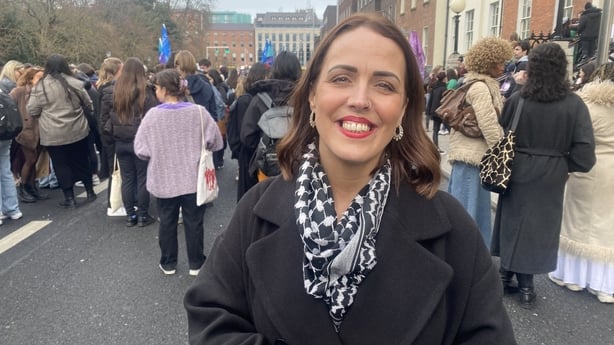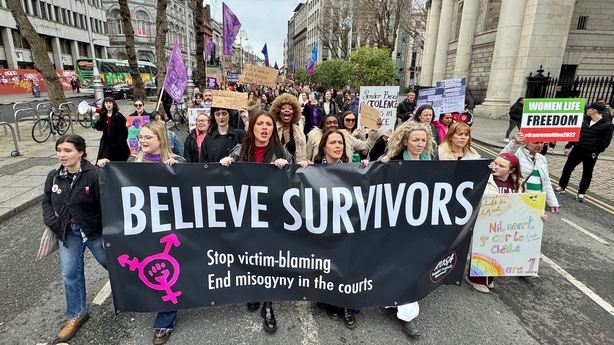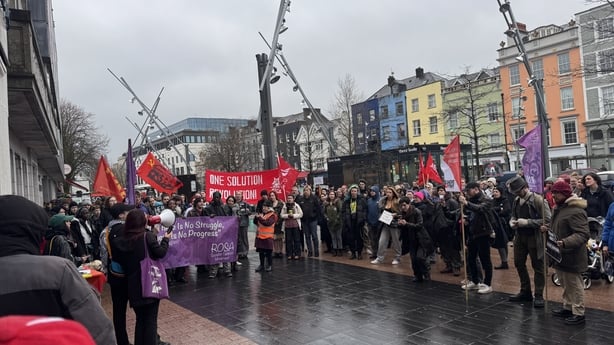Survivors of gender based violence led a protest of thousands of people through Dublin city centre this afternoon, to mark International Women's Day.
Survivors and campaigners Hazel Behan and Natasha O'Brien carried a banner that read 'Believe Survivors' and another fellow survivor Paula Doyle walked alongside them, on a route that went from City Hall to the Department of Justice.
All three addressed the crowd calling for changes to the justice system.
"All the people who showed up, it was actually quite overwhelming, heart warming and moving... so I'm very grateful to everyone," Hazel Behan said.
"Historically, International Women's Day is a day where women came out to try and bring about some change" Ms Behan said, adding that she believed making the justice system "more victim centred as opposed to protecting the perpetrator" was currently the "the biggest change needed in this country."
Ms Behan has been outspoken about her rape in Portugal in 2004, her treatment by Portuguese police, the challenge of going to court and her disappointment at the acquittal last October of the man she believes is her rapist.
Ms Behan has described giving evidence in the trial as "the second most difficult thing I've ever gone through, after the attack itself."

While the violence visited on her and the subsequent trial happened abroad, she has been actively campaigning for sexual violence victims in Ireland.
"I personally have written to every TD in the country," she said.
"Gender based violence doesn't care what your political allegiance is... it affects us all."
Natasha O'Brien, who was beaten unconscious by a then serving member of the Defence Forces in Limerick in 2022, spoke to the crowd about the Court of Appeal's decision earlier this year to overturn the three year suspended sentence given to her attacker, jailing him instead for two years.
"We did change the injustice that happened to me," Ms O'Brien said.
"We can keep going and see that in every courtroom in the country.
"My fight isn't over, we're only getting started," she said.
Today's International Women's Day demonstrations come just over a week after the Dáil passed a private members motion by People Before Profit/Solidarity TD Ruth Coppinger, setting out a ten point plan for action on gender violence.
The plan, which was unopposed by Government, includes measures to protect victim's counselling notes from being used at trial and seeks to outlaw the use of character references for those convicted of Gender Based Violence offences.
"We're particularly now going to seek a meeting with the Minister for Justice to demand real progress on the ten point plan that the Dáil agreed.
"We want this, not left to gather dust, we want it to be enacted." Ms Coppinger said, speaking outside the Department of Justice.

Meanwhile in Cork, a rally was attended by representatives from a number of political parties.
Following a number of speeches, participants marched from the Grand Parade to the Criminal Courts of Justice on Anglesea Street.
Changes to the rules of evidence in gender-based violence cases are among the issues organisers are pursuing.
"The spirit of International Women's Day is one of protest," said Mare Claire Jennequin, one of the organisers.
"International Women's Day is not about flowers or a pat on the back, it's about protesting for the real change that we need to see.
"The theme this year is the epidemic of gender-based violence and the increase in that, unfortunately."

Chief Executive of the Sexual Violence Centre Cork, Mary Crilly, also attended. She said more needs to be done, particularly by men, to make it clear that gender-based violence will not be tolerated.
Ms Crilly pointed out that the Sexual Violence Centre in Cork was started on International Women's Day, 42 years ago today.
"For us, International Women's Day is really important, not just to celebrate the achievements but to highlight what needs to be done, and that is why I am here," she said.
She said she had seen a number of positive developments over the past four decades.
"One of the big things I have seen changing over the years is that people are being believed - young men and young women coming into the centre who would not have been believed 20 years ago are now being believed.
"I know that there is still a lot to do, a lot of changes have to be implemented in the courts system and different systems, but I think we have to keep the conversation going and that's where the cultural change happens. That's really what we need more than the legal changes, I think," she added.
Galway marchers wear red in solidarity with victims
About 150 people gathered in Eyre Square in Galway for the event.
It was organised by the University of Galway Feminist Society, ROSA, and Galway Feminist Collective and the aim was to draw attention to what they termed "ongoing gender-based violence that women face on an almost daily basis".
The gathering took place at 1pm before the crowd marched to the Spanish Arch and looped back to Eyre Square.
All marchers wore red in a show of solidarity with victims and survivors of gender-based violence.

